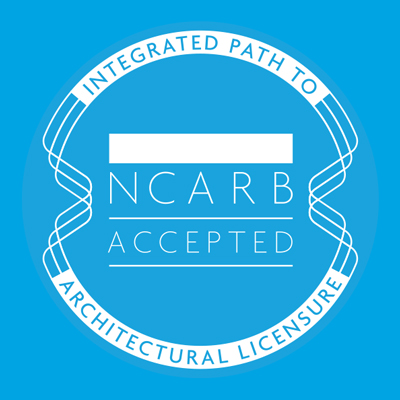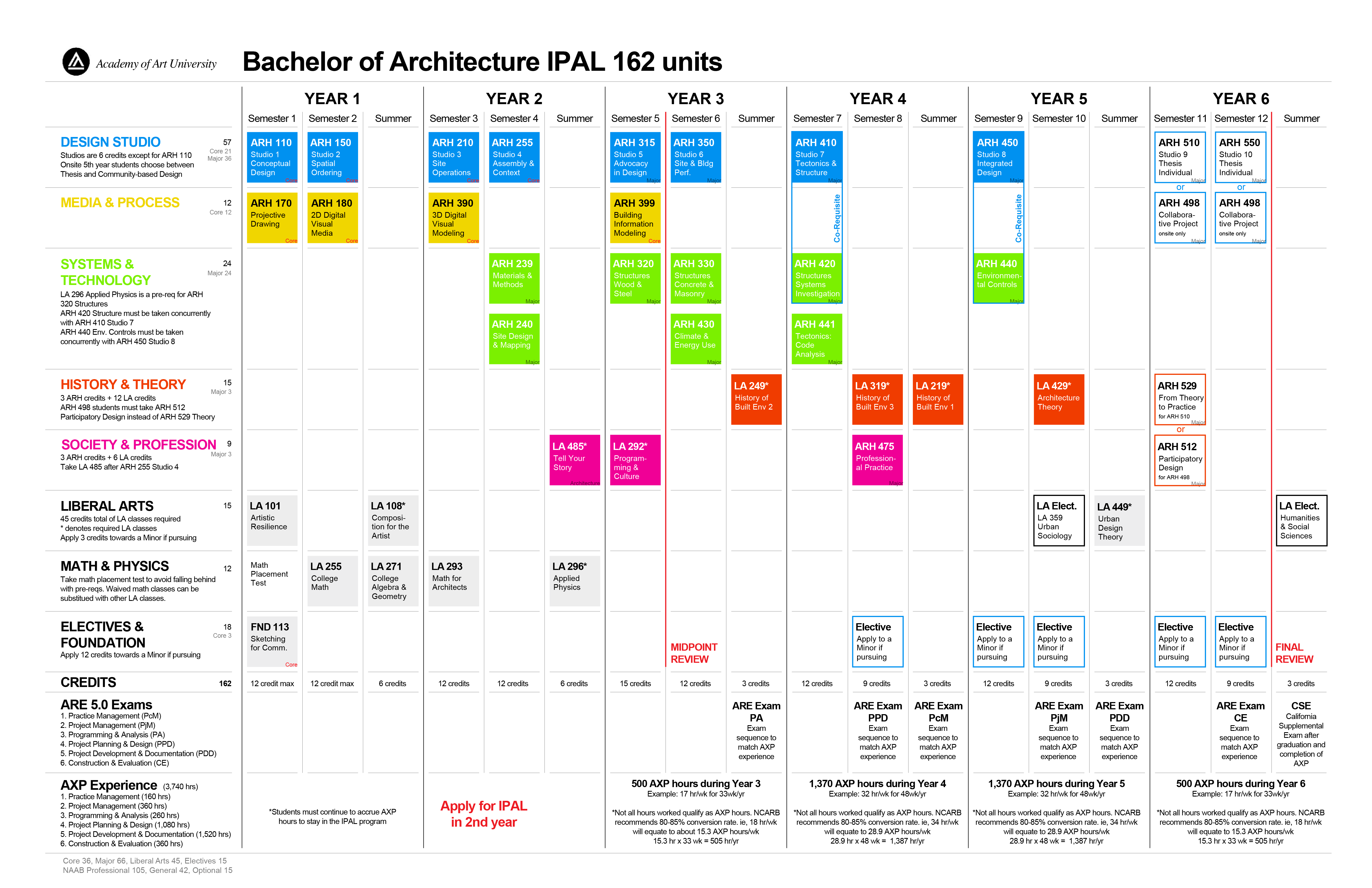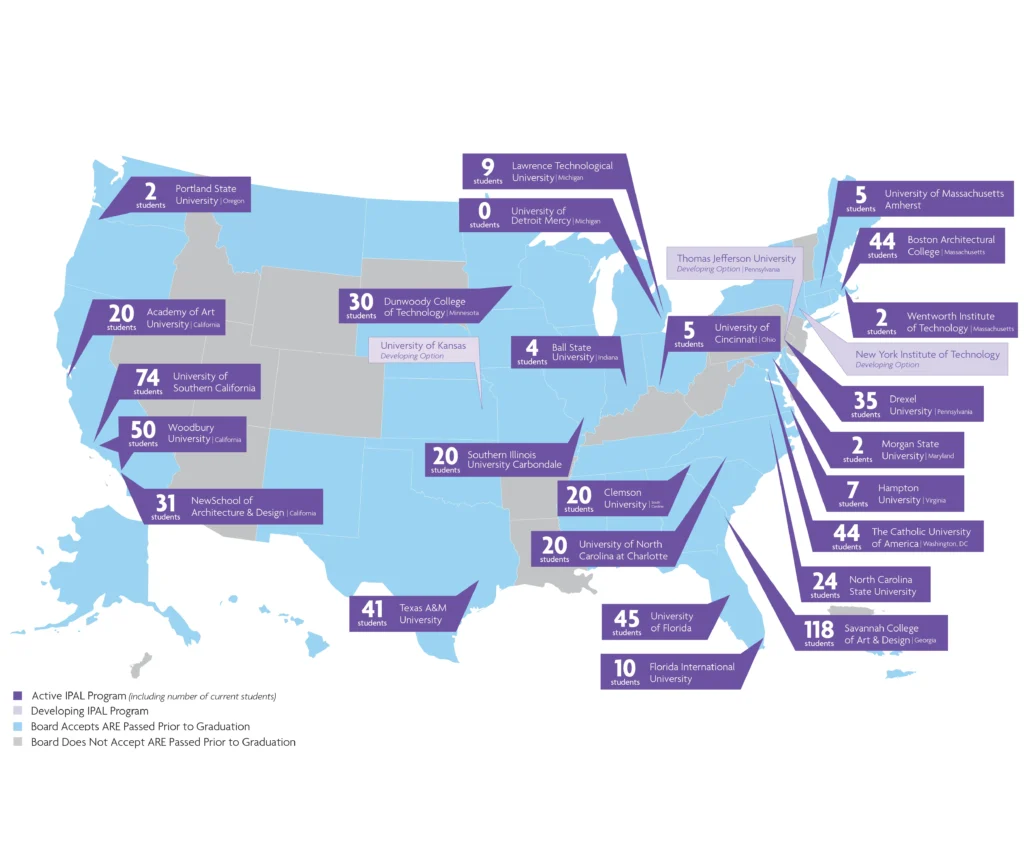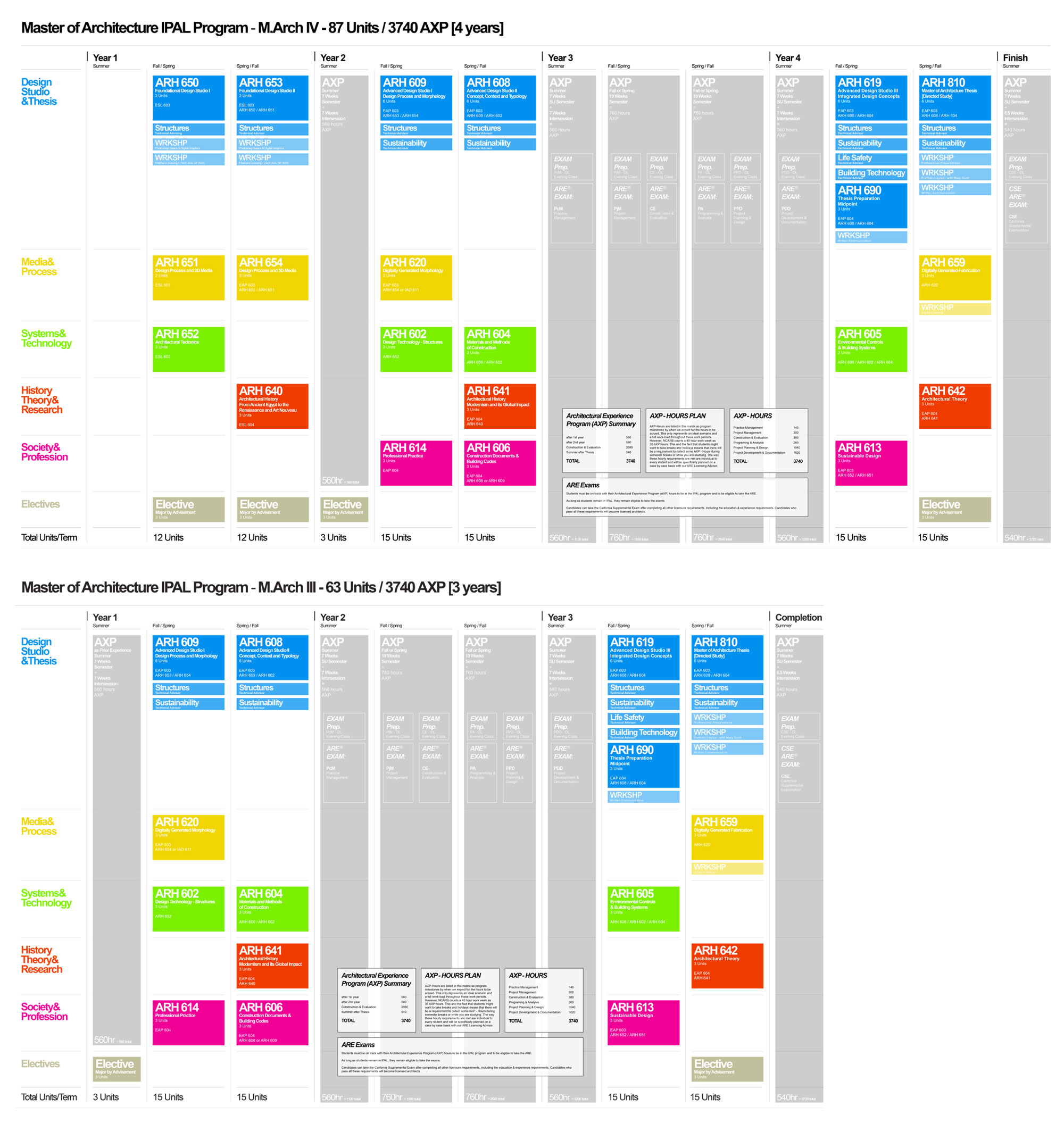
Integrated Path to Architectural License (IPAL)
IPAL Advisor
Karen Seong kseong@academyart.edu
Submit your application at THIS LINK
Overview
The School of Architecture was approved to offer the IPAL path in the Fall 2022 semester in both the B Arch and the M Arch programs. IPAL (Integrated Path to Architectural License) is an alternate path to licensure intended to shorten the amount of time needed to fulfill the licensure requirements. The states in light blue accept the IPAL program as shown in this map prepared by NCARB.
In the IPAL licensure path, students are eligible to be licensed upon graduation. In the traditional licensure path, students must wait to take the licensure exams until after graduation. According to data collected by NCARB, students take an average of 13 years to complete education, experience, and exam requirements.
Due to the compressed schedule, this alternate path will require a high degree of commitment. IPAL degrees are a year longer compared to non-IPAL degrees. The extra year is to allow students to accrue roughly 3 years of work experience while taking courses and taking the licensure exams. For example, the IPAL B Arch will take 6 years compared to the 5-year B Arch. The 3-year M Arch program will take 4 years with IPAL. Interested students must submit an application and interview with the department director and/or the IPAL advisor to be accepted into the program.
More information on IPAL:
- https://www.ncarb.org/earn-a-degree/ipal
- https://www.ncarb.org/become-architect/ipal/students/ipal-faqs
- https://www.ncarb.org/get-licensed/licensing-requirements-tool
Here is a recording of the IPAL presentation by NCARB (National Council of Architectural Registration Boards) which is the organization that oversees the program.
Important Notes
- Students must apply for and be accepted into the IPAL program
- An individualized degree plan will be created for each IPAL candidate
- IPAL advisor will track student progress
- Students in the IPAL program are eligible to take ARE exams
- Students must accrue AXP hours to stay in the IPAL program
- CSE (California Supplemental Exam) must be taken after completing the BArch degree and AXP hours
B Arch IPAL
Undergraduate students must secure employment in an architecture firm to begin accruing work experience. To be eligible for the IPAL program, B. Arch students must take LA 485 Tell Your Story: Personal Statement, Portfolio, Resume. This is a required course for all students starting in 2022. Students who started before 2022 are exempt from this requirement IF they are already working in an architecture firm. Students seeking employment in an architecture firm, but whose degree plan does not include LA 485, should take the course as an elective. This course will help students prepare a personal statement or cover letter, resume, and portfolio to apply for positions in architecture firms.
AXP (Architectural Experience Program)
AXP is a formal process, managed by NCARB, that candidates must follow to log work experience hours accrued. AXP completion rate will depend on individual student circumstance. For more information on AXP, please see the Architectural Licensing Advisor page.
Please note that not all hours worked qualify as AXP hours. NCARB recommends 80-85% conversion rate. For example, 40 hours worked will equate to 32 AXP hours. This is because AXP hours must be under specified experience categories.
Undergraduate Students accruing AXP Hours during Years 3 and 6:
500 hours completed over 35 weeks at an average of 18 hr/wk (equivalent to 15 AXP hours)
In an example scenario, a 3rd year student could accrue 15 AXP hours per week during spring and summer
Undergraduate Students accruing AXP Hours during Years 4 and 5:
1370 hours completed over 48 weeks at an average of 36 hr/wk
In an example scenario, a 4th year student could accrue 28 AXP hours per week during fall, spring, summer
(48-week-year assumes 2 weeks of vacation and 2 weeks of sick time per year)

M Arch IPAL
Frequently Asked Questions
The following student questions were answered by NCARB representatives, ARH Directors, and IPAL Advisors during a Zoom session.
Application Process
Do I need to submit an application to be enrolled in the IPAL program?
Yes, you must apply to be enrolled in the IPAL program. Applications will be reviewed by the IPAL Advisors and the Directors. Once you are approved to enroll, the IPAL advisors will add you to the NCARB database.
Is there a minimum GPA requirement to enroll in the IPAL program at Academy of Art University?
Yes, for undergraduate students the minimum GPA is 2.5 unless approved by the Director and the IPAL Advisor. This is to ensure that your course work will not be negatively impacted. You will need the support of your family to successfully complete the IPAL program. It is very demanding to balance architecture classes with working in an architecture office and studying for the licensing exam. We will advise you to make sure that you have the bandwidth to do handle the workload.
Creating an NCARB Record
What is the NCARB Record and is there a fee?
AXP hours must be logged in your NCARB record. The fee is $100. The annual renewal fee is $85. If the fees are a burden, ask if the architecture firm, where you are accruing your AXP hours, is willing to reimburse you. Architecture firms want to promote licensure among their staff and may support you by reimbursing you for the NCARB Record fees.
I already have an NCARB Record. Do I need to create a new one if I want to enroll in the IPAL program?
No, you will continue to use your existing NCARB record for the IPAL program.
I used different email addresses for the NCARB Record and the IPAL application. What should I do?
Contact NCARB to “merge” your accounts. It is highly recommended that you use the same email address for both. Provide your IPAL advisor with the same email address you used for your NCARB Record.
I use a name that is different than what is on my official ID. Will this be a problem?
Yes, you will be denied entry when you try to take the ARE exam if your ID name does not match the one being used for the IPAL account. Be sure to use your legal name that is shown on your ID that you plan to use to enter the ARE test site.
What is the IPAL Waiver and why do I have to waive this?
The IPAL waiver makes your NCARB Record visible to your IPAL advisor. It is important to check the waiver box so that your IPAL advisor can support you.
AXP
Can I begin logging AXP hours while I am a student?
Yes, you do not need a diploma before you can accrue AXP hours. You can begin earning hours while you are a student. If you are enrolled in the IPAL program, then you MUST accrue AXP hours to stay in the program.
How do I begin logging AXP hours?
By creating an NCARB Record and paying a fee.
Can unpaid work be counted as AXP hours?
No, unpaid work cannot be applied towards AXP per federal law.
Can volunteer work be counted as AXP hours?
Yes. Please consult the AXP Guidelines, available on the NCARB website, for more information.
Must all AXP hours be accrued in an architecture firm?
No, AXP hours can also be accrued in an engineering firm, construction firm, etc. but there are restrictions. Please consult the AXP Guidelines, available on the NCARB website, for more information.
Are design competitions counted as AXP?
Yes, but there are restrictions. Please consult the AXP Guidelines, available on the NCARB website, for more information.
If I work full time at 40 hours per week, how long will it take to complete the required 3,740 AXP hours?
Not all 40 hours apply towards AXP for building competency in the six divisions. For example, your employer will pay you for attending a staff meeting, but this time cannot be logged as AXP hours. As a rule of thumb, about 80-85% of hours worked are usually eligible for AXP hours. In other words, a 40-hour work week will net about 32 hours of AXP hours. Working 40 hours a week, it will take roughly 2.5 years to complete 3,740 AXP hours.
Can I take the ARE exams first and then find an internship to accrue AXP hours?
No, you must accrue AXP hours to stay in the program. Inadequate rate of AXP hours collected will result in being removed from the IPAL program. To maintain IPAL status, you must accrue AXP hours.
I need to take a break from working for a few months. Will I be kicked out of the IPAL program?
No, as long as you make your IPAL advisor aware of your plans, taking a break for a few months is okay.
Who is qualified to be my AXP Supervisor and what are their responsibilities?
https://www.ncarb.org/blog/top-10-faqs-axp-supervisors
Finding a Paid Internship
*Note: The architecture profession has moved away from using the term “intern” to eliminate any ambiguity about whether the position is paid or unpaid. Unpaid internships are illegal and unethical.
How can I get help finding a paid internship in architecture?
Start with your local AIA chapter’s job board. LinkedIn, Archinect, Glassdoor, Indeed are common places where architecture firms post job openings. Leverage your professional network starting with your faculty.
For undergraduate students, this topic is covered extensively in the course LA 485 which is required for the IPAL program. LA 485 is a required course for BA and BArch students starting in fall 2022. For returning students, you can take this course as an elective. It is highly recommended for all students regardless of their enrollment in the IPAL program.
Graduate students should start with the resources available on the ARH blog.
Are there any resources for finding jobs that can work with this program?
Students in the Bay Area can take advantage of the local architecture firms that have written letters of support for AAU’s IPAL program. You must submit a portfolio that shows that you have the skills to meet qualifications. The firms include Gensler, HOK, Gould Evans, Huang Iboshi, Atelier Siletz, Richardson Pribuss, Dialog Design .
For our online students, your IPAL advisors will support you through the job application process. We are also in the process of expanding our professional network beyond the San Francisco Bay Area.
How much should we expect to get paid as an intern?
Pay varies by region. The AIA Salary Calculator is a good resource https://info.aia.org/salary/
For undergraduate students, this topic is covered extensively in the course LA 485 which is required for the IPAL program. LA 485 is a required course for BA and BArch students starting in fall 2022. For returning students, you can take this course as an elective. It is highly recommended for all students regardless of their enrollment in the IPAL program.
Completion
Is it possible to work part time and still complete the IPAL program on time?
Yes, individual circumstances will vary so it is best to make a plan with your IPAL advisor.
If I need more time to complete the IPAL program, can I delay my graduation?
No. You must graduate when you have completed your course work and the required number of credits. However, you may opt to take fewer courses to balance classes with work. Lowering the credit load per semester will delay your graduate date. But when you have taken your last class, you must graduate. Upon graduation, you will no longer be in the IPAL program.
What happens if I leave the IPAL program?
Life happens and there may be circumstances beyond your control that make leaving the program inevitable. All AXP hours earned will stay in your NCARB record. Any ARE exams you passed will also stay as part of your record. Leaving the IPAL program does not invalidate any AXP hours or ARE exams. Instead of graduating with the IPAL B Arch or IPAL M Arch, you will graduate with a B Arch or an M Arch. If you have passed some, but not all ARE exams, be sure to pass the remaining exams within the 5-year rolling clock. All 6 divisions of ARE must be completed within 5 years.
I work full time at an architecture firm and am almost finished with my NCARB record requirements. How would this affect my path with IPAL?
Enrolling in IPAL does not diminish AXP hours already in your existing NCARB Record. If you are almost done with the AXP hours, but don’t want to wait until after graduation to take the ARE exams, then you can enroll in the IPAL program.
I am in my final year of my degree program. Is there a benefit to enrolling in IPAL?
You can enroll the IPAL program in your final year if you want to take at least some of the ARE exams before graduating. You can also graduate with a non-IPAL degree and start taking the exams after you graduate. The decision is up to you.
I am graduating this summer. Will I be eligible to take the ARE immediately upon graduation?
Depending on the jurisdiction you want be licensed in, you could be made eligible this summer. NCARB will need the school’s registrar to send your transcript to NCARB first. Then you can request that NCARB transmit your NCARB Record to the jurisdiction.
Reciprocity and NCARB Certification
My state does not accept IPAL. Does this mean I cannot enroll in the IPAL program?
Through a process called Reciprocity, you can transfer your license from one state to another state. Obtain licensure in a state that accepts IPAL, then with NCARB Certification, apply for reciprocal licensure in another state. NCARB Certification is free in the first year of licensure and 50% in the second year. Get reciprocity in the first year of your licensure to take advantage. Though many states accept Reciprocity, always check with your state first to confirm.
What happens if you get licensed in a state that accepts IPAL, but then move to a state that doesn’t accept IPAL?
Most states do not have a residency requirement which means you can pursue licensure in a state in which you are not a resident. You can graduate with an IPAL degree, get licensed in a state that accepts IPAL (even if that is a different state than where you live), then transfer your license to another state. Always check with your state first to confirm.
Could I get my AXP in Canada and pass my ARE in Florida?
Yes. Canada is a participant in the Reciprocity program. Always check with your state first to confirm.
ARE
I didn’t pass all six divisions of the ARE exams. Can I still graduate with the IPAL degree?
Yes, IPAL students do not need to pass all six exams to graduate as IPAL students.
Are there resources available to help students prepare for the ARE exams?
School of Architecture offers Amber Book test prep study material to 20 of our IPAL students – pending annual budget approval. When you are ready to register for an exam, please inquire with the IPAL advisor. Amber Book is a vide0-based study material. Here is a video created by Amber Book called “7 Things I Wish I Knew Before Taking the ARE.”
In addition, full length ARE practice exams for all 6 divisions are available for free. Find it in your NCARB record. Local chapters of AIA also offer ARE study groups. More information is on the NCARB website.
Are there exam accommodations?
English as a second language accommodation is available. Test takers are allowed more time. More information on the NCARB website.
Other
How can I connect with other IPAL students in the program?
We encourage you to find other IPAL students at this Discord link https://discord.gg/2zkeqjd8Hg Some of our students have started taking the ARE exams. And many have been using Amber Book to study for the exams. Amber Book is offered to 20 IPAL students who are ready to sit for an exam at no additional cost to students.


